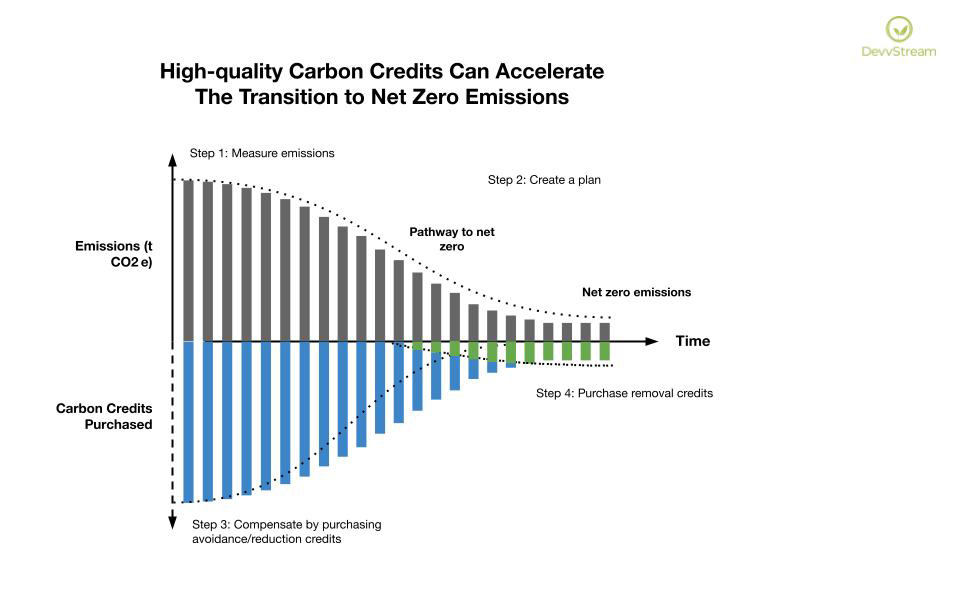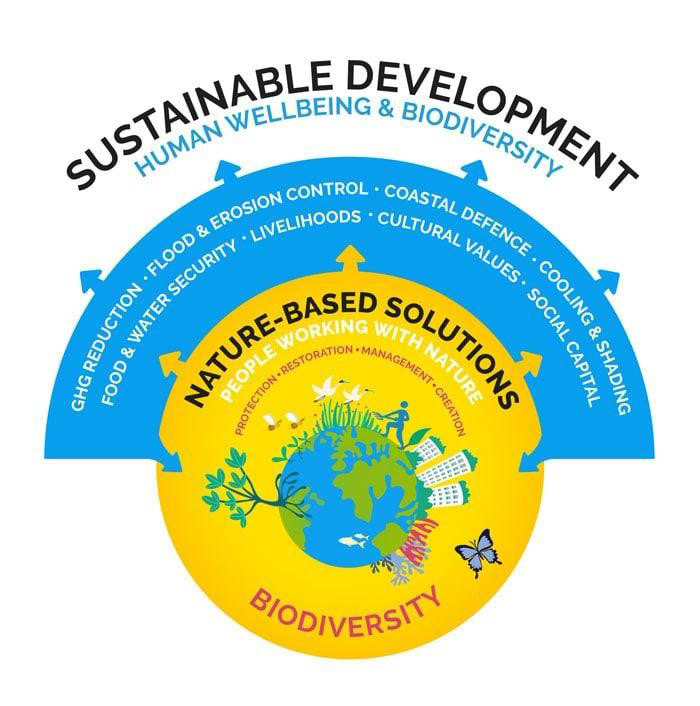As stated by the Paris Agreement, Climate Change poses one of the greatest risks to survival of the human species. Leading climate scientists have warned that there are only about a dozen years for global warming to be kept to a maximum of 1.5°C, beyond which even half a degree will significantly worsen the risks of drought, floods, extreme heat and poverty for hundreds of millions of people. Increased greenhouse gas (GHG) emissions, driven in large part by human activity, has strengthened the greenhouse effect and contributed to global climate change, threatening ecosystems, biodiversity, economies and human livelihood.
It is imperative to utilize all the tools available to reduce and remove GHG emissions from the atmosphere. It is necessary to deploy at scale a wide range of innovations in record time. While carbon credits are not a silver bullet to fight Climate Change, DevvStream believes, as acknowledged by the latest IPCCC’s report, that carbon markets are a fundamental transitional tool to achieve rapid decarbonization by deploying capital to incentivize actions to avoid, reduce and remove carbon emissions in the most efficient manner.
Consequently, DevvStream invests in large-scale avoidance, reduction and removal offset projects, with a focus on technology-based solutions (TbS) along with some nature-based solutions (NbS). We believe that the rapid deployment of both are a fundamental necessity to mitigate the impact of anthropogenic greenhouse gas emissions and avoid the worst effects of climate change.
DevvStream’s project investments meet the highest standards when it comes to environmental integrity. This is why all of our investments are aligned to criteria set by leading organizations, including:
- United Nations’ Sustainable Development Goals (SDGs), adopted by the United Nations in 2015 as a universal call to action to end poverty, protect the planet, and ensure that by 2030 all people enjoy peace and prosperity. The 17 SDGs are integrated—they recognize that action in one area will affect outcomes in others, and that development must balance social, economic and environmental sustainability.
- Carbon Offsetting and Reduction Scheme for International Aviation (CORSIA), developed by the International Civil Aviation Organization (ICAO). Its goal is to have a carbon neutral growth from 2020. Under CORSIA rules, aircraft operators have to purchase carbon credits from the approved carbon offset programs. Starting in 2021, the scheme is voluntary for all countries until 2027.
- Taskforce on Scaling Voluntary Carbon Markets (TSVCM), led by Mark Carney, UN Special Envoy for Climate Action and Finance and former governor of the Bank of England.
Enabling Trust and Transparency in the Carbon Markets
DevvStream provides an additional layer of trust and transparency to all managed projects by leveraging Devvio’s DevvX’s blockchain platform to track each credit generated thanks to robust data shared on the blockchain.
DevvESG is built on the world’s only ISO-compliant green blockchain, DevvX, and provides a comprehensive set of features for companies to leverage their credits in a broader AIR Methodology incorporating risk and performance analysis, full project transparency and provenance of data, and easy standardized ESG reporting. The tight coupling of DevvESG to DevvStream projects and credits adds unmatched trust and transparency to credit creation, acquisition, transactions, and retirement.
Technology-based Solutions (TbS)
Technology-based solutions are generally defined as those that leverage technology and innovation to further avoid, reduce or remove greenhouse gas emissions to mitigate the environmental impact of human activities. While NbS are fundamental to achieve our decarbonization targets, TbS have the potential to generate immediate environmental benefits by leveraging capital and technology to address key economic sectors.
DevvStream works with project developers to identify and develop innovative TbS projects that meet the highest standards when it comes to environmental integrity, which in turn drive a higher market value for corresponding credits. Some examples include:
- Renewable power generation, such as wind, solar, biomass, geothermal, and more.
- Demand-side efficiencies, such as LED light bulb replacement.
- Industrial processes, such as fuel switch (gas to electric/hydrogen), N2O destruction, capping of abandoned oil wells, and more.
- Buildings, both operational reductions (e.g. high-efficiency lighting/HVAC/mechanical systems, building envelope) and embodied carbon (e.g. low-carbon concrete, mass timber, etc).
- Manufacturing and construction, including building materials such as low-carbon concrete, low-rolling resistance asphalt, and more.
- Transportation, such as fuel switch (e.g. gasoline to BEV), modal shift (e.g. truck to barges/rail, SOV to public transit), and more.
- Carbon capture and storage (CCS), including concrete, plastic, mineralization.
- Chemical processes, such as advanced refrigerants, SF6 replacement, and more.
- Waste management, including (food) waste landfill diversion, methane recovery, composting and more.
Nature-based Solutions (NbS)
According to the Nature Based Solutions Initiative, nature-based solutions (NbS) are solutions to societal challenges that involve working with nature to deliver benefits for people and biodiversity. They include the protection, restoration or management of natural and semi-natural ecosystems; the sustainable management of productive land and seascapes; or the creation of novel ecosystems such as urban ‘green infrastructure’.
Source: Nature Based Solutions Initiative
DevvStream works with project developers worldwide to develop unique and impactful projects that generate both environmental benefits as well as positive impacts on the local communities, in alignment to United Nations Sustainable Development Goals (SDGs).
Examples of nature-based solutions include agriculture, forestry (deforestation, reforestation, afforestation), and ocean carbon capture and storage solutions, also called ‘blue carbon’. These projects are expected to drive demand for credits in the short term due to its wide-range applicability, particularly those that meet high-quality offset criteria in a transparent manner, including accurate and conservative quantification of its environmental benefits.
Our selection criteria
DevvStream invests in projects that meet the highest criteria when it comes to environmental integrity and strong financial performance. Projects must:
- Be aligned strategically to DevvStream’s mission
- Generate high-quality offsets, CORSIA-eligible only
- Be aligned to United Nations Sustainable Development Goals (SDGs)
- Be complementary to DevvStream’s existing portfolio while targeting key economic sectors
- Have global reach
- Have a social impact for the local people and communities where the projects take place



